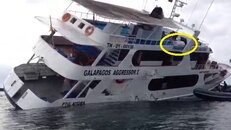What is being said is true and something I have posted before in the S. American forum. Galapagos liveaboards all have Ecuadorian owners no matter who handles the marketing and sales. So resolving issues can be more complicated. In this case, the US office can deal with straight up reimbursements (for cancelled trips post accident), but must come to an agreement with the owner of the boat in Ecuador for compensation. That's not an attempt to absolve anyone for anything, just the way things are.
The lady's firsthand account is frightening to read, but it sounds to me like the crew was trying to use the Zodiacs and not 'lifeboats'. Zodiacs are lifted and secured when in transit, usually one on each side of the boat, so it sounds to me like the crew did a superb job to free them under the circumstances. And given the situation, Zodiacs with motors designed to hold all passengers for diving, rather than lifeboats without motors, seems logical if possible.
I have received complaints about many aspects of Galapagos liveaboards over the years (most common-hot tub wasn't working), but never about theft. So the crew theft allegation is a new one for me. Theft on a ship in Galapagos means you lose a job most work so hard to get. Employment opportunities are not abundant there, especially secure ones. I've often left money in my purse in my cabin, and other valuables like computers and cameras. Even on the little speedboats that serve as a ferry transfer between islands, theft is considered an affront. Locals ship things to other islands all the time and theft is pretty low especially in light of the opportunity to steal that exists. I know I have even sent a suitcase and forgot to remove $400 from an outside, unlocked zipped pocket. Bag went to 2 islands and then in a taxi to a hotel and yet, no one touched my money. I've even shipped envelopes of cash between islands on a passenger ferry without problems. (No banks on Isabela can make paying hotels, tours, etc a challenge and this is sometimes the only way.)
Now, having said that, if a boat has an accident, it is true that locals descend upon it like thieves picking a car left by the freeway in the Bronx of yore. I had reports that local fishermen were even diving the next day to see what they could salvage below. And no one would dare report anyone looting because everyone is related in some manner -either by blood or proximity. I was told by the owner of the Alta when it ran aground a few years back that they were not allowed to remove anything from the ship due to local law and insurance. This is commonly known so locals with access indeed come pick it clean. Can't blame the Aggressor crew for concentrating on everyone's safety over their belongings. It's awful and I would be gutted to lose computers, cameras, documents, dive gear, etc. but I would probably be more upset if recovering my belongings had been a priority over safety, even equal to it in terms of the priority. I do hope anyone who was onboard is compensated through the Aggressor or insurance.
I wondered early on if it would have been possible to post a guard, but in retrospect, probably not. Again, no one there could be trusted (not to turn a blind eye) and no one from the outside could get there quick enough to have stopped the looting given the reality of logistics to get to Galapagos from the mainland. I know this seems like a contradiction to my 'no theft culture' statement above, but there is a difference between thieving and looting if you can understand what I mean. The former is not at all culturally acceptable whereas a blind eye is turned towards the latter in these circumstances. I think they must see it as salvage rather than looting.
Still have no clue as to how this could have happened. Nor the Alta running aground basically in port on an islet with a beacon signal. My first thought was that someone wasn't paying attention. Anyone up to the position of timonel (first mate) or Captain can sail these waters without GPS. When I'm onboard, I love having crew members point out to me (and young ones, not just the older ones) stars they used for navigation in Galapagos before GPS. So I'm baffled at the how of this on such a common route. And getting no answers, btw, when I ask that question. Maybe no one knows yet. Easier to blame it on equipment failure than own up to incompetence or plain human error in that situation. There is a strong trend in the culture to reason (err..excuse) away responsibility. I'm sorry is rarely heard. Instead you get an explanation of why it's not their fault.









